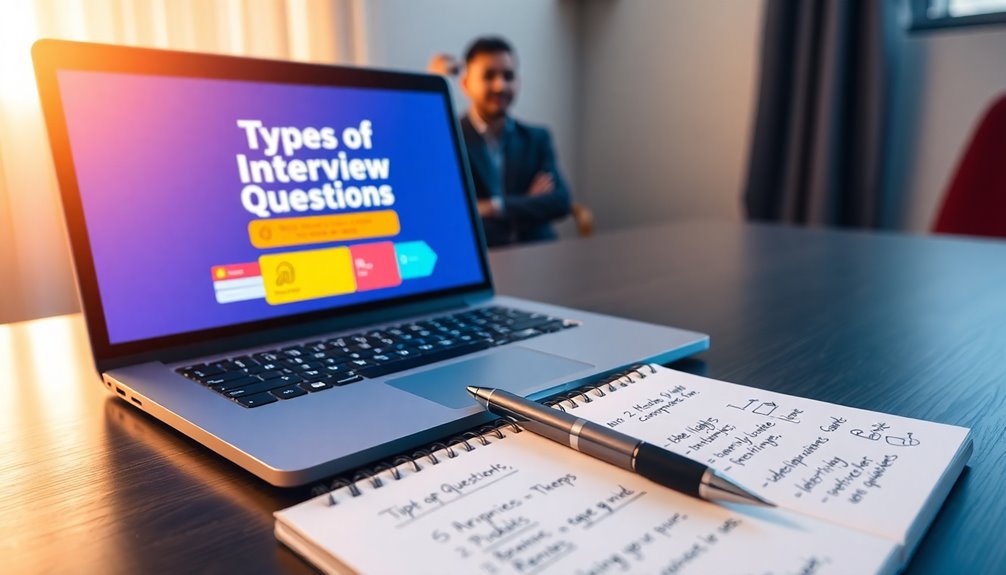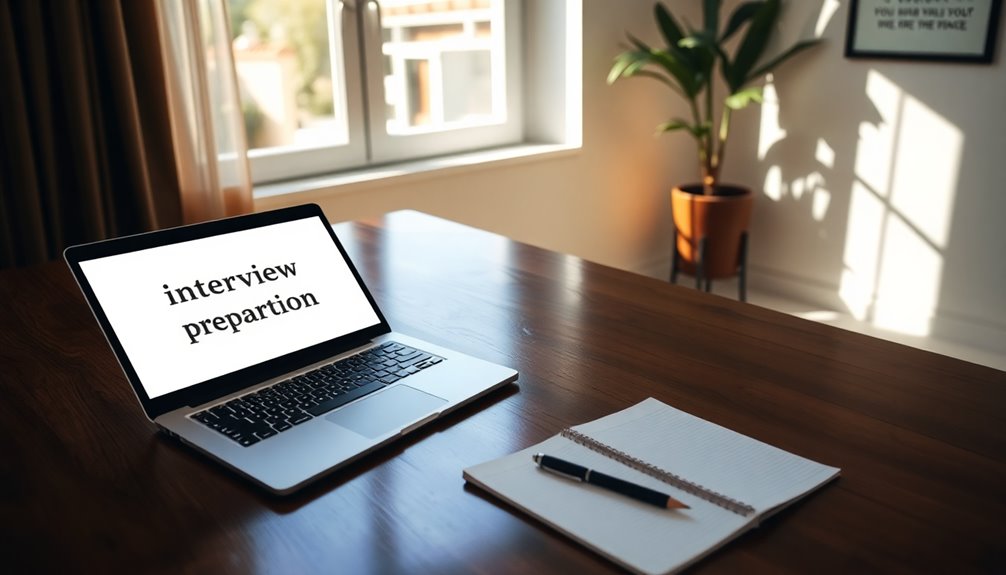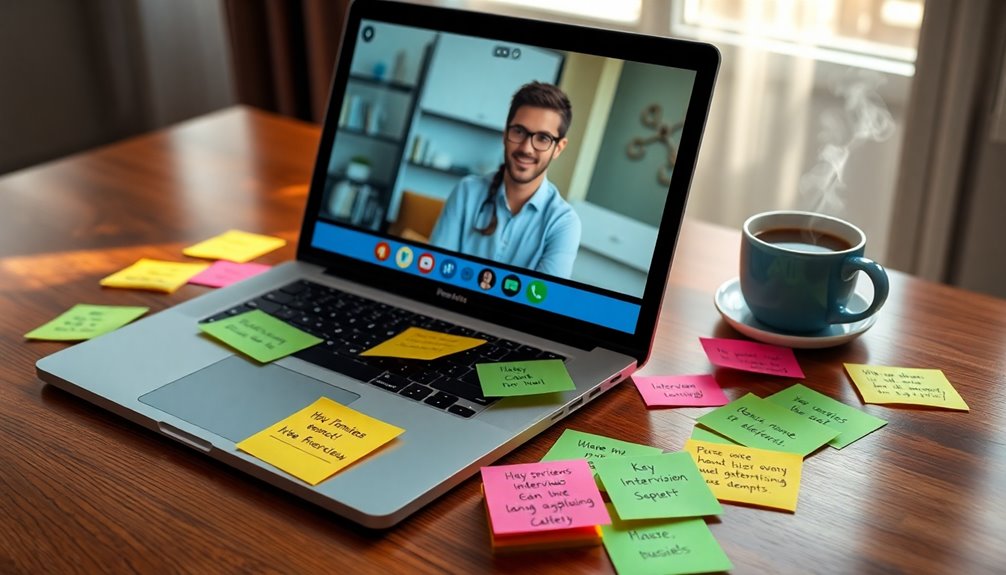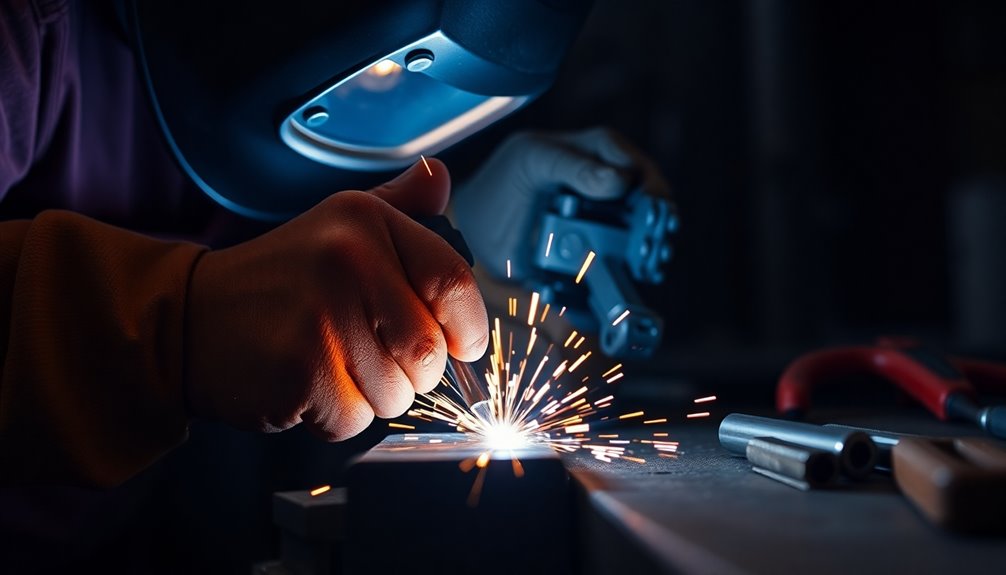To nail your tech interview, focus on key questions that assess your technical skills and cultural fit. Be prepared for behavioral and situational questions using the STAR technique to structure your responses. Brush up on technical knowledge relevant to the role and show your problem-solving abilities through practical examples. Don't forget to research the company's mission and values, which will help you tailor your answers effectively. Finally, prepare thoughtful questions to engage the interviewer. Mastering these aspects will boost your confidence and readiness for the interview ahead. There's more to uncover to truly stand out.
Key Takeaways
- Prepare for behavioral questions using the STAR technique to effectively showcase past experiences and relevant strengths.
- Familiarize yourself with common technical questions to demonstrate your expertise and problem-solving abilities during the interview.
- Research the company's mission and culture to tailor your responses and highlight alignment with their values.
- Practice mock interviews to build confidence and refine your delivery, ensuring clarity in your responses.
- Be ready to articulate your career goals and how they align with the company's objectives, showing commitment to growth.
Understanding Technical Interviews

Understanding technical interviews can be intimidating, but clarity about their structure and purpose can ease your anxiety.
These interviews primarily assess your technical knowledge and problem-solving skills for tech-related positions. They can take various formats, including phone, online, or in-person sessions, lasting anywhere from one hour to an entire day.
You'll face a mix of traditional questions, brainteasers, and technical tests tailored to evaluate your expertise. Besides your technical abilities, interviewers also look for cultural fit within the company.
Familiarizing yourself with the interview process helps you prepare effectively, allowing you to showcase your skills confidently.
Types of Interview Questions

Interview questions can be categorized into several types, each serving a distinct purpose in evaluating your fit for a tech position.
Behavioral questions focus on your past experiences, helping interviewers gauge how well you might adapt to their company culture.
Situational questions present hypothetical scenarios to assess your problem-solving skills and decision-making abilities.
Technical knowledge questions target your specific expertise, ensuring you have the necessary skills for the role.
Education-related questions discuss your academic background and relevant training, while problem-solving questions evaluate your analytical thinking.
Mastering Behavioral Questions

Mastering behavioral questions is essential for showcasing your fit within a company's culture and values. These questions help interviewers gauge your past experiences and how they align with the role.
To excel, use the STAR technique to structure your answers effectively.
- Situation: Briefly describe the context of your experience.
- Task: Explain your specific responsibility in that scenario.
- Action: Discuss the steps you took to address the situation.
- Result: Highlight the outcomes and what you learned.
Prepare by reflecting on your experiences, focusing on challenges, successes, and teamwork. This approach not only demonstrates your skills but also proves you can thrive in the company's environment, showcasing your strong communication skills and ability to build rapport with diverse teams.
Navigating Situational Questions

Situational questions can be tricky, but they offer a valuable opportunity to showcase your problem-solving skills and decision-making abilities. When faced with these hypothetical scenarios, take a moment to think critically about the situation presented.
Use the STAR technique: outline the Situation, describe the Task at hand, explain your Actions, and highlight the Results. This structured approach not only provides clarity but also demonstrates your thought process.
For example, if asked how you'd handle a project with unclear instructions, emphasize your ability to seek clarification, adapt, and communicate effectively.
Importance of Technical Skills

While technical skills are essential for success in tech roles, they also play a crucial role in how you present yourself during the interview process. Demonstrating your technical abilities can set you apart from other candidates. It shows potential employers that you not only understand the job requirements but can also contribute effectively from day one.
- You'll need to articulate your technical knowledge clearly, making complex concepts accessible.
- Technical skills can help you tackle problem-solving questions with confidence, showcasing your analytical mindset.
- Proficiency in relevant tools and languages signals your readiness to adapt and learn within the company's tech ecosystem.
Focusing on these aspects can greatly enhance your chances of making a positive impression.
Effective Interview Preparation

Effective interview preparation is essential for standing out in a competitive job market. Start by researching the company's mission, products, and culture. This knowledge helps you tailor your responses and demonstrate genuine interest.
Next, review common technical interview questions and practice your answers using the STAR method to articulate your experiences clearly. Conduct mock interviews to build confidence and refine your delivery.
Gather relevant examples that showcase your skills and achievements, ensuring they align with the job requirements. Finally, prepare thoughtful questions to ask the interviewer, showing your engagement and curiosity about the role.
Cultural Fit Assessment

Understanding cultural fit is essential in technical interviews, as it helps determine if you'll thrive within the company's environment.
Employers want to see how well you align with their values and team dynamics. To effectively assess cultural fit, consider these key elements:
- Company Values: Research the organization's mission and values to see if they resonate with you.
- Team Dynamics: Understand the collaborative style of the team you'll be joining, as this impacts your daily interactions.
- Adaptability: Reflect on your ability to adapt to different work environments and how that aligns with the company's culture.
Avoiding Common Mistakes

Cultural fit can greatly influence your success in a technical interview, but it's equally important to avoid common mistakes that can undermine your performance.
First, don't walk in unprepared—research the company and understand its values. A strong brand identity can enhance your chances of aligning with the company culture, as it reflects their mission and priorities. Additionally, being aware of AI ethical implications can help you navigate discussions about technology's impact on society. Remember that emotional alignment can play a significant role in how you present yourself and connect with the interviewers, making your preparation even more vital.
Next, clearly articulate your technical skills; vague responses can leave interviewers confused. Always back your answers with specific examples; storytelling makes your experience relatable and memorable.
Don't overlook soft skills; teamwork and communication matter just as much as technical abilities. Emphasizing your resilience in overcoming past challenges can demonstrate your growth mindset to potential employers. Moreover, showcasing your ability to maintain emotional alignment during conflicts can highlight your interpersonal skills in a professional context.
Finally, remember to ask thoughtful questions about the role or company; it shows your genuine interest. Additionally, being aware of filial responsibility laws can help you understand potential financial obligations that might affect your career decisions. Engaging in mindful practices during the interview can also create a positive atmosphere, reflecting your awareness of self-care and its importance in professional interactions.
Importance of Follow-Up

The follow-up after an interview can be a crucial factor in your job search success. Sending a thank-you note shows your appreciation for the opportunity and reinforces your interest in the position.
It also allows you to address any concerns or questions that arose during the interview. Here are a few key reasons why follow-up matters:
- Reiterates your interest: It emphasizes your enthusiasm for the role and the company.
- Builds rapport: Establishing a connection with interviewers can open doors for future opportunities.
- Provides a chance for feedback: You might gain valuable insights to improve your future interviews.
Discussing Strengths and Goals

While preparing for your tech interview, discussing your strengths and career goals can greatly enhance your appeal as a candidate. Identify your top strengths, such as problem-solving skills or technical expertise, and be ready to share specific examples that demonstrate these abilities.
Use the STAR method to frame your stories, highlighting situations where your strengths led to positive outcomes.
When discussing your career goals, align them with the company's mission and values. Articulate a clear vision for your future, showing how this role fits into your long-term aspirations.
Employers appreciate self-awareness and a commitment to growth, so don't shy away from mentioning areas for improvement, along with steps you're taking to address them. This balance will make you a compelling candidate.
Frequently Asked Questions
What Should I Wear to a Technical Interview?
For a technical interview, aim for a smart-casual outfit.
You can't go wrong with a pair of slacks or chinos and a nice button-up or polo shirt. If you're unsure, check the company's dress code by looking at their website or social media.
Avoid overly casual items like jeans or t-shirts.
Remember, presenting a polished appearance shows you're serious about the opportunity and respect the interviewer's time.
Confidence comes from feeling good in what you wear.
How Long Does a Technical Interview Typically Last?
A technical interview often lasts between one hour to a full day, depending on the company and role.
For instance, imagine you're interviewing for a software engineering position at a tech startup. You might face a one-hour phone screening followed by a three-hour in-person session with coding challenges and discussions.
This setup helps the employer gauge your technical skills, problem-solving abilities, and cultural fit within the team, ensuring they find the right candidate.
Can I Ask for Clarification on Questions During the Interview?
Absolutely, you can ask for clarification during an interview. If a question isn't clear, it's better to seek further details than to guess. This shows your willingness to engage and guarantees you understand the expectations.
Don't hesitate to restate the question in your own words or ask for examples to clarify. Remember, effective communication is key, and asking questions demonstrates your critical thinking skills and desire to provide accurate answers.
What Resources Can I Use for Technical Interview Preparation?
You can't possibly prepare enough for a technical interview, right? Well, fear not! Immerse yourself in resources like LeetCode for coding practice, Coursera for relevant courses, and books like "Cracking the Coding Interview" for essential tips.
Join online forums or study groups to share insights and experiences. Mock interviews are a game-changer, too!
With these tools, you'll build the confidence and skills you need to shine in your interview.
Is It Acceptable to Negotiate Salary After Receiving an Offer?
Yes, it's absolutely acceptable to negotiate salary after receiving an offer.
You've worked hard to get to this point, and discussing compensation shows your value.
Research industry standards and know your worth before initiating the conversation.
Be polite and professional while expressing your expectations, and be prepared to discuss your skills and experiences that justify your request.
This approach can lead to a more satisfying compensation package.
Conclusion
As you prepare for your tech interview, remember that every question is an opportunity to showcase your unique skills and experiences. Like a puzzle, each piece you share can reveal the bigger picture of who you are as a candidate. Stay confident, embrace the challenges, and don't shy away from highlighting your strengths. By mastering these key questions, you'll not only impress your interviewers but also take a significant step toward landing your dream role.









